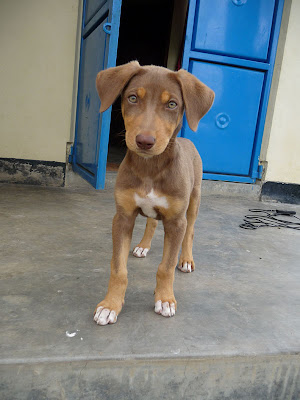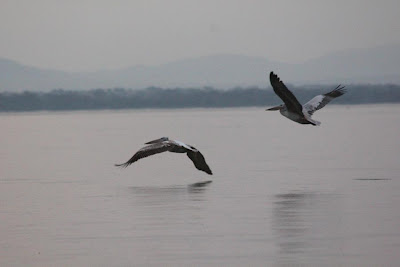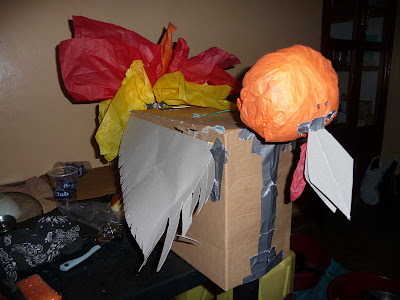Happy Thanksgiving! Today is emotionally difficult since Thanksgiving might just be my favorite holiday, and thoughts of the whole family of 25+ people gathered around the table is almost too much to handle. Despite that, I just had two wonderful Skype sessions - one with my amazing friend Chelsea, who is studying abroad in Spain, and the other with Mom and Pappo. Definitely something to be thankful for! I'm hoping to get solar power at my house very soon so that I can stay in better touch with the rest of the world (already helped by my discovery of the BBC on a local FM station... world news! wow!). While I debated whether getting solar power is really in the true Peace Corps spirit, I reminded myself that a) most of my PCV friends have electricity at their houses (or at least do when the power isn't out), and b) that I will be much saner and happier, and therefore effective as a volunteer, if I can keep in closer contact with friends and family back home, be able to do research for work, do workout videos, watch movies, etc.
Two weeks ago, I enjoyed a weekend in Mbarara with other PCVs - some from my training group, and others I was meeting for the first time. It was great to swap stories from site, eat good food (although with ridiculously long wait times), and just be around other Americans for a while, with no one staring at the strange way we do things. However, when I returned to site, I surprised even myself when I got that wave of relief, that "I'm home" feeling. I think having a dog really helps with that, but regardless of the reason, it was great to realize I'm getting used to things and feeling like, in some aspect, I belong here.


Kibo, 10 weeks :)
As far as work goes, I've been busy doing lots of needs assessments, both within my organization and in the community. The highlight happened this past Saturday when I met with a group from the community who came after I requested the local chairman (mayor-type guy) to mobilize people for a needs assessment activity. I did two activities - Community Mapping (asking people to draw a map indicating the resources they value in their communities, what they'd like to see that isn't there, etc.) and Needs Assessment. The mapping exercise started out as a trainwreck, mostly because I followed one of the guidelines from a Peace Corps manual - "start with a familiar landmark, such as a river, road, etc." So, naturally, I asked them to start by drawing the road that runs through our trading center. This turned into the men and women collaborating (after I'd asked them to work separately) to draw a roadmap to all the neighboring villages. Not the goal. After reassessing again and again, we finally got a usable resource map, but by that point I just wanted to move on to the more straight-forward Needs Assessment. But! Despite all these difficulties, we came up with a list of priorities, ranked in order, that the community feels it needs. #1 was a technical school (#2 was to get Holstein/Friesian cows, which I hope to come back to at another time, but the meeting was already 4 hours long...). So, I explained that as a PCV I come with no money, only ideas, so how can we mobilize local resources to start a technical school? We started listing resources such as a brickmaker, land, teachers, etc., but then realized that construction would still be costly. So I proposed an idea: rather than build a physical school, why not try a community-based apprenticeship program, where students go directly to the carpenter's shop, the salon, etc. to train? They liked the idea and within a few minutes, we had a committee of women who would go out to find prospective teachers. Some people argued that we should first ask for "help" (aka money) before we start, but others reiterated what I had said - that if we wait for outside help, it might never come, so we have to act first, ask for help later if we need it. We're supposed to meet again in 2 weeks, and I really hope they follow through with their commitment - I couldn't believe how immediately dedicated they were to the idea of starting this technical school. That's my whole goal - have the community take ownership. That's a famous quote about leadership, "Go to the people. Live with them. Learn from them. Love them. Start with what they know. Build with what they have. But with the best leaders, when the work is done, the task accomplished, the people will say, 'We have done this ourselves.'" (Lao Tzu, ~500 BC). Perfect quote for Peace Corps. But that doesn't exclude the fact that on the inside, just to hype up the excitement about the situation, I'm telling myself that I started a technical school the other day. P.S., I apologize for the length of this paragraph.
Also, I did teach handwashing and tippy-tap building (see my last post) at the two local primary schools this week, and it was a huge hit! The kids seemed really into it, especially when I got them to all sing "Happy Birthday" while they tried out the tippy-tap to make sure they washed their hands for the right length of time. I encouraged them all to go home and build tippy-taps at their houses so their families have somewhere to wash their hands. I even went so far as to promise I would visit their house if they came and told me they had built a tippy-tap (a promise I may soon be regretting when 83 children show up at my doorstep asking me to come to their homes), but I didn't want to give the kids candy, as some of the teachers and my co-workers were telling me I should do, as that would just reinforce the stereotype that white people bring candy and pens for kids (it's bad enough that I get asked for sweeties from kids in bigger cities when walking down the street). I asked the teachers to invite me back next term if they would like me to teach other health topics, and they expressed great interest - they also added they want me to teach PE, with lots of American games and songs. So, I'm going to try to find a creative way of combining health messages with fun games and songs. Their next term starts in February so I have a few months to start brainstorming.
I've read quite a few books in the past couple of weeks (having no electricity will do that to you), and one that I really recommend is
Dark Star Safari by Paul Theroux. A former PCV, he details his overland trip, by any means possible, from Cairo to Cape Town. He isn't afraid to offend the reader and dole out criticism, whether to foreign aid or local conditions, so reading this book is a trip into his uncensored mind as he traverses the continent. His attack on foreign aid definitely got me thinking, and the ideas that foreign aid makes things worse (which are not unique to Theroux) are definitely something I struggle with. Also, I'm halfway through
The Horse Whisperer and thought it was hilarious that the husband and wife met when she was a VSO volunteer and he was in Peace Corps. However, I lost faith in the author's vision of Peace Corps when he first described the PCV as owning a jeep (ha!), and second when he said that "most [PCVs] are dope-heads or bores or both." Maybe that used to be true, but the majority of our group here in Uganda is amazingly motivated and qualified to be here.
I made peanut butter no-bake cookies last week (soooo good, especially after weeks of practically only rice, potatoes, beans, and sometimes pasta), and invited my neighbor and counterpart to come have some. At first they were very skeptical (and I'll admit, they look a bit like cow shit - flat, amorphous globs of chunky brown goo) but after tasting them they couldn't stop eating them, and practically demanded to be present the next time I make them, which I can tell you will be sometime very soon.
I've been getting up early to go running (okay, I'm pretty slow so I guess it's jogging, but running sounds so much more serious) and the views of the sunrise are worth every lost minute of sleeping in. If I pass kids on their way to school, they start running with me, which right now is pretty comical, but I enjoy running alone to gather my thoughts and have "me" time, so this will probably wear on me. But nothing can detract from the beauty of a sight like this out my front door in the morning:

I had a frustrating moment the other day when a complete stranger showed up at my doorstep, trying to pretend he wanted to have a conversation but was really just asking for money. It made me incredibly irate (and this wasn't a homeless man in rags, he was wearing a nice dress shirt and slacks), so I had to remind myself that most people here are more than generous towards me - a friend of my neighbor's bought me muchomo (grilled meat) and eggs for no apparent reason, people bring me fruit all the time, one of the primary schools gave me a HUGE bag of fruit and beans as a thank-you for teaching about tippy-taps... most people here show me their thanks for my presence in huge ways.
Ironic moment of the week: Seeing a young girl walking on the side of the road carrying a shopping bag from Bata, a big shoe store chain, but wearing no shoes.
Tomorrow, I'm heading through Kampala (meeting a friend for lunch at our favorite pizza/dessert place and shopping) and then meeting up at another friend's site, about an hour northeast of Kampala, for the weekend. We're cooking all day on Saturday and having our Thanksgiving dinner on Saturday night. The proposed menu: chicken (few turkeys available and no oven to cook one in), homemade bread, stuffing, mashed potatoes, salad, cranberry sauce, spicy pumpkin soup, vegetarian gravy, rice, veggie medley, apple pie, mango crumble, and pumpkin pie. YUM! Next blog entry: detailing the success (and hopefully no lack-thereof) of preparing a huge Thanksgiving feast in Uganda.

















